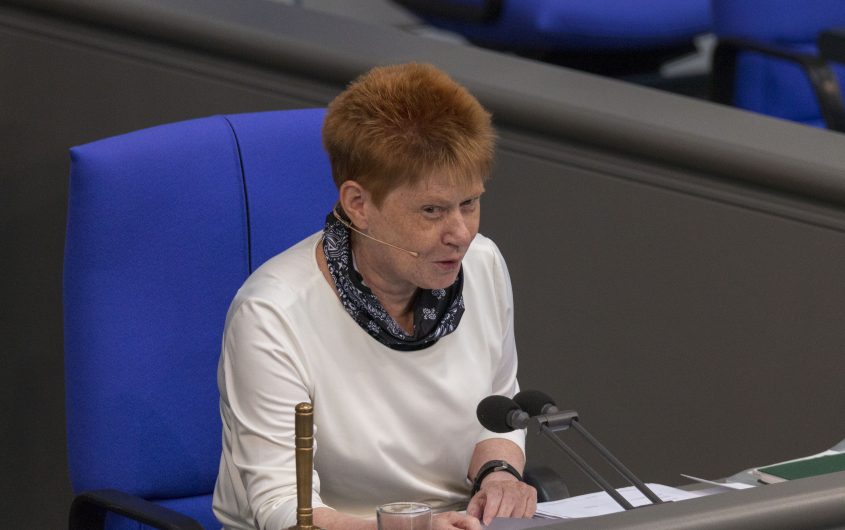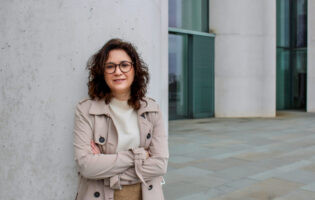
Olaf Kosinsky via Wikimedia Commons
AGI Profiles: Petra Pau

Milena Kagel
Ms. Milena Kagel is a research intern at AICGS for the summer of 2022. She supports resident fellows with their research projects, manages databases, and helps organize and document AICGS events.
Ms. Kagel graduated from Oberlin College in 2020, where she studied History and German Studies. She spent her third year of college studying abroad at the Ludwig-Maximilians-Universität in Munich as part of an exchange program sponsored by the Federation of German-American Clubs. Her research interests include topics related to migration, education, historical memory and youth culture in Germany and Austria.
After graduating from college, Ms. Kagel spent two years work as an English Teaching Assistant through Fulbright Austria's USTA program. She will begin a Master's program in History at the University of Vienna this fall.
Vice President of the Bundestag
Background
Petra Pau is a German politician and member of Die Linke. Pau is currently the longest-serving Vice President of the Bundestag and has held the position since 2006. In this role, she oversees legislative sessions and works alongside other Vice Presidents and the President of the Bundestag, Bärbel Bas.
Pau was born on August 9, 1963, in East Berlin, the capital of the GDR. In her studies, she earned a qualification to teach Art and German and later graduated from the Socialist Unity Party’s higher education institute with a diploma in social sciences. Prior to becoming a politician, Pau worked as a teacher of German and Art, the leader of a pioneer group, and a member of the Central Council of the Free German Youth (a state-sponsored youth organization).
Politics
Pau eventually made her foray into politics in 1983, when she joined the Socialist Unity Party (SED). She also spent several years working as a chairwoman for the Democratic Socialist Party (PDS), the political party that emerged out of the dissolution of the SED following the fall of the Berlin Wall.
In 1998, Pau was elected to the Bundestag for the first time as a representative of the Berlin-Mitte/Prenzlauer Berg constituency. After the PDS failed to reach the 5 percent threshold required for representation in the Bundestag, she served as an unattached member of the Bundestag and the representative for Berlin-Marzahn-Hellersdorf for three years, before eventually joining the democratic socialist party Die Linke.
Positions
Politically, Pau has distinguished herself by focusing on human rights and democracy. She has been outspoken in her rejection of anti-Semitism, racism, and right-wing extremism. Pau places great importance on taking note of instances of discriminatory and politically-motivated violence in Germany—she lists such instances on her website quarterly and highlights the importance of achieving justice in each case. Pau has supported broader policy aims to combat anti-Semitism, racism, and right-wing extremism, such as stricter digital regulations on online hate speech and the establishment of a monitoring center that could hopefully prevent violent acts from occurring.
Throughout the COVID-19 pandemic, Pau has firmly opposed a nationwide vaccine mandate and has encouraged the government to focus on its public health communications strategies. In a recent parliamentary vote, Pau (along with a majority of Linke party members) opposed raising the minimum wage for part-time jobs, arguing that this would weaken the effect of increasing the federal minimum wage. Pau has also voted for the introduction of a so-called “self-identification law” that would support the rights of transgender and intersex individuals’ legal self-determination.
Pau has consistently stood for military disarmament and has opposed German military action in places such as Afghanistan, Lebanon, and Sudan. In response to recent budget increases for the German military related to the war in Ukraine, Pau remarked that the money could be invested in social goods, such as salaries for public servants, instead of being “pulverized” by the military.
East Germany
Petra Pau’s East German background, in conjunction with her past affiliation with the SED, has often prompted questions about her political loyalties, ideology, and motivations. Other members of parliament have occasionally disparaged her as a Stalinist or tried to draw connections between Pau and the East German Ministry for State Security, the Stasi (a famously repressive secret police agency). In the days leading up to her initial election as Vice President of the Bundestag in April 2006, members of the Green Party accused Pau of being active in organizations founded by ex-Stasi members, such as the Initiative for the Protection of Social Rights of former Members of the Armed Services and Customs Administration of the GDR. Pau has outright rejected these allegations as “absurd,” and has emphasized that she sees herself as “an opponent of any sort of glorification of the state of affairs in the GDR.” Pau once again combatted accusations of being overly sympathetic to former members of the Stasi in 2011, when it was revealed that her new secretary previously worked for the ministry.
Interestingly, the modern German government has kept a watchful eye on Pau and her fellow party members. A 2012 article in Der Spiegel revealed that Die Linke as a whole, and Pau in particular, had been subjected to years-long monitoring by the secret service of the Federal Ministry of the Interior and Community under the guise of constitutional protection. (When asked about this, Pau has categorically rejected the ministry’s justification for secretly gathering information on politicians).
On her part, Pau has been open about her previous affiliation with the SED and the fact that she “did not take to the street” during the peaceful revolution that led to the fall of the Berlin Wall in November 1989. Moreover, Pau has never shied away from the topic of East-West relations and has instead expressed her concern that “the rift between East and West has gotten bigger.” Though her connection to the GDR may always provide a cause for concern for some, Pau asserts that her background has, if anything, solidified her commitment to democracy rather than weakened it.









